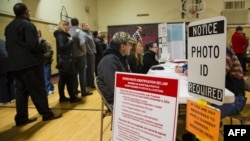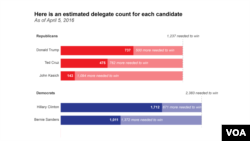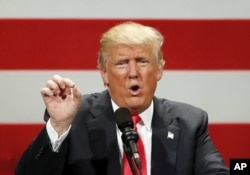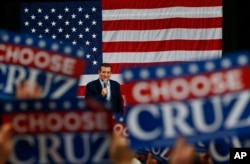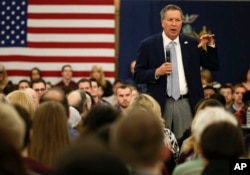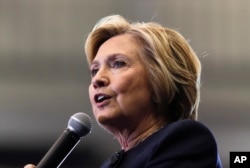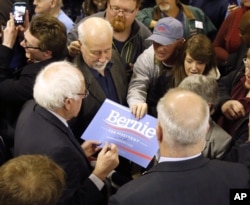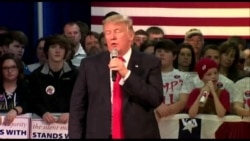Polls opened for Democratic and Republican presidential primary voting in Wisconsin Tuesday, where Texas Senator Ted Cruz and Vermont Senator Bernie Sanders are looking for big nights to overcome the leaders for their party's nominations.
Republicans intent on blocking billionaire businessman Donald Trump face a key test in the state, perhaps their best chance to slow down the front-runner's campaign and his hopes of securing the 1,237 committed delegates before the July party convention in Cleveland.
Denying Trump the delegates he needs to claim the nomination before July could lead to a contested convention in Cleveland, an uncertain outcome Trump supporters would love to avoid.
Latest polls
The latest polls in Wisconsin put Trump's rival, Cruz, in the lead with Ohio Governor John Kasich trailing well behind.
Trump has campaigned in Wisconsin with the hope of putting behind him last week’s problems, which included a notable misstep on abortion and a vehement defense of campaign manager Corey Lewandowski, who faces a battery charge in Florida for allegedly grabbing a reporter’s arm last month.
“He’s had a terrible, terrible week or 10 days where he’s been on the defensive, for a guy who in the past has been on the offensive," Norman Ornstein, a resident scholar at the American Enterprise Institute (AEI), told VOA. "He’s shown tremendous weaknesses as a candidate and as a potential president."
Trump has tried to rally Wisconsin voters by reminding them of his initial appeal as a political outsider ready to bring a businessman’s ethic to the White House.
“I’m really a good businessman. I’m so good at business, oh, you people are going to be so rich so fast you don’t even know. You don’t know how rich you are going to be,” Trump told supporters at a rally in Wausau, Wisconsin, where he was joined on the stage by former Alaska Governor and 2008 Republican vice presidential nominee Sarah Palin.
Chance for Cruz
Wisconsin presents the best chance yet for Cruz to reassert his relevance in the race.
In addition to slowing Trump’s march to the nomination by denying him delegates, a Cruz victory in Wisconsin would further solidify his status as Trump’s main challenger, possibly setting up a multiballot confrontation at the Republican convention in July.
Cruz has been intent on trying to take advantage of Trump’s recent problems and buttress the complaints that Trump is not a true conservative and is thin on presenting real policy prescriptions to address issues.
“Because while he’s very good at yelling and attacking and insulting, he does not have meaningful solutions to the problems facing this country,” Cruz told reporters during a recent campaign swing through Wisconsin.
Kasich trails badly in the delegate count, but hopes to be in the mix if the convention becomes contested.
“We are gathering momentum, both from the political side and the fundraising side, and we are looking forward to a fun convention,” he told reporters in Philadelphia where he has been campaigning in advance of the Pennsylvania primary on April 26.
Cruz and Kasich have accused each other of being unable to defeat a Democrat in the November general election, and depending on interpretations of the current delegate count have claimed the other is already mathematically eliminated from winning the nomination.
"Someone is not electable if he can't get elected," Cruz said about Kasich during a Fox News broadcast Monday.
House Speaker Paul Ryan has been cited in recent months as a possible consesus nominee if the convention balloting goes into multiple rounds. Ryan has denied interest in that scenario, but has not outright refused to consider it.
Responding to those reports Monday, Cruz told reporters, "That's simply not going to happen."
Outsider candidates
AEI resident scholar Ornstein said Trump and Cruz will have amassed far too many delegates to be denied at the convention in favor of Ryan, who has not campaigned at all.
He said delegates will be more inclined to go for Kasich – who has been in the race all along – if the convention goes to multiple balloting.
“There’s a really strong antiestablishment feeling out there in the Republican electorate – 60 to 70 percent support going to outsider candidates," Ornstein said. "Paul Ryan is a very conservative guy, but he’s widely seen at this point as a member of the establishment."
Trump is warning things could get worse if he’s denied the nomination at the convention and has refused to rule out a third-party bid for the White House if he’s denied the nomination in Cleveland.
“It’s a question of treatment,” he said in an interview on Fox News Sunday. “I want to run as a Republican ... (but) I’m going to have to see how I was treated.”
Wisconsin also presents a test on the Democratic side, where front-runner Hillary Clinton trails challenger Sanders in the latest Wisconsin polls.
Clinton has shifted her focus between Sanders and Republican front-runner Trump in recent days.
“I have 1 million more votes than Donald Trump and I have 2½ million more votes than Bernie Sanders,” Clinton told supporters at a recent rally in Purchase, New York, ahead of that state's primary on April 19.
Sanders campaign
Ornstein said a Sanders win in Wisconsin “may change the conversation about Hillary’s chances, but it won’t change the reality on the ground."
Recent polls give Clinton a lead in New York, but the margin has been dropping in recent weeks, and Sanders will make an aggressive push in the state in which he was raised.
“We are fighting hard in Wisconsin. We think we have got a real shot to win here in New York and then it is on to many, many other states,” Sanders told ABC’s Good Morning America program.
Clinton continues to hold a lead over Sanders in the overall delegate count and especially among the super-delegates, but Sanders has won five of the last six Democratic contests and is riding a momentum wave at the moment.
Ornstein said of Sanders, “With the money he’s got and the support he’s got, he’s sticking around."
WATCH: Related video report by VOA's Jim Malone




